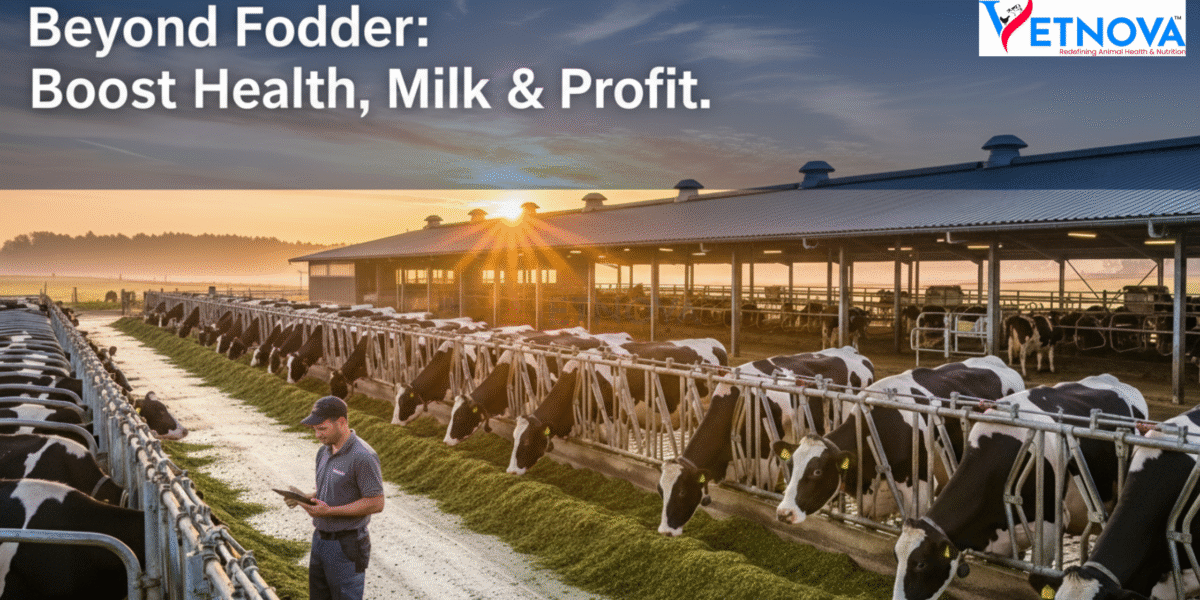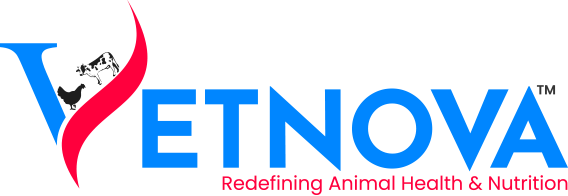The Complete Guide to Cattle Feed Supplements: Boosting Health, Milk Yield, and Farm Profitability
Modern dairy and livestock farming is undergoing a transformation. Where once farmers relied purely on natural fodder, today they are increasingly aware that proper nutrition requires more than just grass, silage, or grains. A cattle feed supplement bridges the nutritional gap, ensuring that cows and buffaloes perform to their maximum potential—whether it’s producing more milk, conceiving on time, or raising healthier calves.
This guide dives deep into what a cattle feed supplement really is, the science behind mineral mixtures, how to pick the right product, and the long-term benefits for farmers.
- What is a Cattle Feed Supplement?
- Why Cattle Need More Than Just Fodder?
- Benefits of Mineral Mixture for Cow Health
- The Science Behind Mineral Mixtures
- Difference Between Cow Feed Supplement and Mineral Mixture
- How to Choose the Best Cattle Feed Supplement ?
- Practical Benefits Farmers Can Expect
- Risks of Ignoring Supplements

What is a Cattle Feed Supplement?
A cattle feed supplement is a scientifically designed product that adds concentrated nutrients such as proteins, vitamins, minerals, probiotics, and energy boosters into a cow’s daily diet. Unlike regular fodder, which is variable in quality and often nutrient-deficient, supplements ensure that cattle consistently receive the right balance of essential nutrients. Supplements don’t replace fodder. Instead, they enhance it. Think of them as the missing pieces of a puzzle: without them, cattle may survive, but they will not thrive.
Why Cattle Need More Than Just Fodder?
Fodder and crop residues form the base of most diets, but multiple studies show they lack essential nutrients. Depending on the region and season, cows often experience deficiencies in:
- Calcium and Phosphorus – crucial for strong bones and consistent milk production.
- Copper, Zinc, and Manganese – play a vital role in immunity, fertility, and skin health.
- Magnesium and Sodium – regulate digestion and nerve function.
- Vitamins A, D, and E – support reproduction, calf growth, and disease resistance.
Farmers who rely solely on grass or crop residues usually face these common problems:
- Reduced milk yield and lower fat percentage.
- Weak calves with poor growth rates.
- Fertility issues, delayed heat cycles, and repeat breeding.
- Frequent diseases and higher veterinary costs.
This is why cow feed supplements as mineral mixtures have become indispensable. The Importance of Cattle Mineral Mixture in Dairy Farming Among all supplements, cattle mineral mixture is the most widely used and effective. It ensures cattle get a precise balance of macro and micro minerals that are otherwise missing in their feed.
Benefits of Mineral Mixture for Cow Health
- Improves Milk Yield and Quality – Balanced minerals, especially calcium and phosphorus, directly improve milk volume and fat content.
- Boosts Fertility – Trace minerals like zinc, copper, and selenium enhance reproductive efficiency and reduce repeat breeding.
- Supports Strong Calves – Adequate minerals ensure proper bone and muscle development in newborns.
- Strengthens Immunity – Minerals help cows resist infections, reducing the need for antibiotics.
- Cost-Effective Farming – Better feed utilization means lower wastage and higher productivity.
Farmers who switch to the best mineral mixture for cattle often report noticeable improvements within 4–6 weeks. Both in milk output and overall herd health.
The Science Behind Mineral Mixtures
Macro Minerals
- Calcium & Phosphorus – Essential for milk production, bone strength, and reproductive health.
- Magnesium – Prevents metabolic diseases like milk fever.
Sodium & Potassium – Balance fluids and digestion. - Chlorine: water metabolism and nutrient uptake, osmotic pressure, and acid-base equilibrium. Plays a role in protein digestion.
- Sulphur : formation and maintenance of cartilage, bone, tendons, and blood vessel structure. Sulfur is found in the B-vitamins thiamin and biotin and is a component of the amino acid’s methionine and cysteine.
Trace Minerals
- Zinc – Supports immunity and wound healing.
- Copper – Improves pigmentation, fertility, and disease resistance.
- Manganese – Play crucial roles in bone and cartilage formation, metabolism, immune function, and reproductive health.
- Cobalt – Helps in Vitamin B12 synthesis.
- Iodine – Critical for thyroid function and metabolic activity.elenium – A powerful antioxidant that prevents infertility and weak calves.
A mineral mixture for cow ensures these nutrients are present in the right proportion, preventing both deficiency and toxicity.
Difference Between Cow Feed Supplement and Mineral Mixture
Many farmers use the terms interchangeably, but there is a difference:
- Cow Feed Supplement → A broad category that includes proteins, vitamins, probiotics, and energy sources in addition to minerals.
- Cattle Mineral Mixture → Specifically focused on macro and micro minerals.
Both are essential. Supplements may provide any or many nutrients, while mineral mixtures fine-tune the mineral balance.
How to Choose the Best Cattle Feed Supplement?
Not all supplements are equal. Choosing wisely ensures better returns. Here’s what to look for:
Balanced Nutrient Profile
Check whether the supplement contains essential macro minerals, trace minerals, vitamins.
Bioavailability
Minerals should be in highly absorbable forms like chelates or glycinate complexes. These are easier for cattle to digest and utilize compared to inorganic forms.
Certifications & Safety
Look for trusted certifications such as:
- FSSAI (India’s regulatory body)
- WHO-GMP
- GMP+
- FAMI-QS (global feed safety standard)
- Purpose-Specific Formulas
Some supplements are tailored for lactating cows, others for dry or pregnant cows. Always choose based on the animal’s stage of life.
Practical Benefits Farmers Can Expect
Farmers using a cattle feed supplement or cattle mineral mixture regularly can expect:
- 10–20% increase in milk yield with improved fat and SNF levels.
- Faster growth in calves with fewer diseases.
- Improved reproductive efficiency, reducing calving intervals.
- Stronger immunity and fewer health issues.
- Higher profits due to better feed-to-milk conversion ratios.
Case studies show that investing in quality supplements often reduces veterinary expenses by 15–20% annually.
Risks of Ignoring Supplements
Skipping supplements may save money short-term but leads to:
- Reduced milk yield → direct revenue loss.
- Fertility problems → longer calving intervals.
- Weaker calves → lower market value.
- Higher disease incidence → rising vet bills.
In contrast, consistent use of cow feed supplements creates healthier, more productive herds.
Read more on how-to-increase-snf-in-cow-milk-Click here
Common Myths About Cattle Feed Supplements
- “Fodder alone is enough” – Modern high-yielding cows require far more nutrients than fodder can provide.
- “Supplements are artificial” – In reality, they supply natural nutrients in concentrated form.
- “All supplements are the same” – Quality varies widely; only the best mineral mixture for cattle ensures proper absorption.
Risks of Ignoring Supplements
Skipping supplements may save money short-term but leads to:
- Reduced milk yield → direct revenue loss.
- Fertility problems → longer calving intervals.
- Weaker calves → lower market value.
- Higher disease incidence → rising vet bills.
In contrast, consistent use of cow feed supplements creates healthier, more productive herds.
How to Introduce Supplements in Daily Feeding
- Mix mineral mixtures with dry or green fodder.
- Provide supplements during morning feeding for better absorption.
- Follow dosage instructions carefully to avoid wastage or overdose.
- Consult a veterinarian or nutritionist for herd-specific recommendations.
Future of Cattle Nutrition – A Sustainable Approach
As global demand for milk rises, farmers must focus on efficiency and sustainability. Supplements designed with natural, bioavailable ingredients reduce the need for antibiotics, improve fertility, and lower environmental waste.
Companies like Vetnova are leading this change by offering transparent, science-backed formulations that help farmers achieve more with less.
Conclusion
The success of modern dairy farming depends on smart nutrition. A cattle feed supplement is not an expense—it’s an investment in higher milk yield, healthier calves, and stronger farm profitability.
By using the best mineral mixture for cattle and trusted cow feed supplements, farmers can ensure balanced nutrition, sustainable production, and a healthier future for both livestock and consumers.
Remember: well-fed cattle are productive cattle, and every drop of milk starts with the right nutrition.
